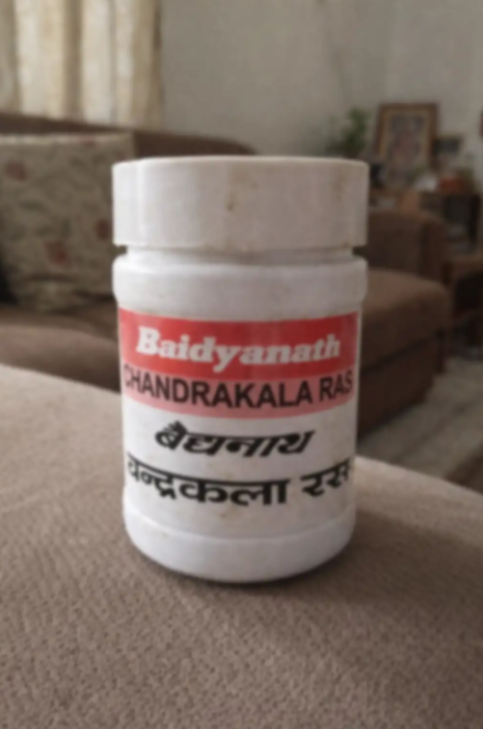Key Benefits of Baidyanath Chandrakala Ras (MYU)
- Helps manage internal bleeding like haematemesis and haematuria
- Soothes discomfort in urinary tract, easing dysuria.
- Supports healthy respiratory function during hemoptysis
- Balances Pitta to reduce excessive heat & bleeding
- Promotes gentle detoxification of blood impurities
- Nourishes reproductive tissues boosting strength
- Acts as herbal rejuvenative for vitality & stamina!
Product Description of Baidyanath Chandrakala Ras (MYU)
Baidyanath Chandrakala Ras is a classical Rasa Shastra formulation crafted with care and deep respect for ancient wisdom. It’s one of those preparations that feels like it’s been around forever, comforting and reliable. The blend comprises potent herbo-mineral components—each processed meticulously to ensure purity and potency, though honestly the process seems almost mystical to me.
This tablet is traditionally indicated in internal bleeding disorders such as haematemesis (vomiting blood), hemoptysis (coughing up blood), haematuria (blood in urine), and various urinary affections. It calms the overly agitated Pitta dosha and brings about internal stability. Some users say they felt a subtle cooling sensation, like a breeze easing a burning fire within.
In many Ayurvedic texts, Chandrakala Ras is mentioned as a blood tonic and haemostatic aid. Although modern readers might find the combination of metals, minerals, and herbal extracts unusual, each ingredient carries a lineage of traditional use. You might wonder about safety—that’s fair, but Baidyanath’s classical protocols ensure these bhasmas and pishtis are processed under strict conditions.
Taken regularly, this rasa can support overall vitality, particularly for those experiencing chronic low-grade bleeding or Pitta-related imbalances. It’s often paired with Baidyanath Ashokarishta or Dadimavaleha for enhanced urinary comfort and better absorption. And yes, you might notice a slightly earthy taste at first, but it soon fades leaving a sense of calm.
Key ingredients with descriptions of Baidyanath Chandrakala Ras (MYU)
- Kajjali: Mercury-sulfur based compound central to many Rasa Shastra formulas.
- Tamra Bhasma: Incinerated copper ash processed per traditional Ayurvedic technique.
- Moti Pishti: Pearl calcium powder celebrated as a mineral supplement in classics.
- Abhrak Bhasma: Processed mica ash revered for its Rasayana properties historically.
- Giloi: A climbing shrub often mentioned as a rejuvenative herb in Ayurvedic texts.
- Kutaki: A bitter root used traditionally in detoxification rituals in Ayurveda.
- Pitpapara: Ayurvedic herbal powder noted for its soothing plant-based qualities.
- Khus: Vetiver root prized for its fragrant and cooling attributes in formulations.
- Choti Pippal: A type of long pepper included in certain classical Ayurvedic blends.
- Vanshlochan: Baked bamboo manna known from Rasashastra literature for purifying.
- Shwet Chandan: White sandalwood utilized for its cooling and aromatic character.
- Anantmool: The root of Hemidesmus indicus referenced for its mild traditional uses.
- Nagarmotha: Nutgrass rhizome included historically for its earthy essence.
- Meetha Anar: Sweet pomegranate rind powder cited in classical recipes.
- Milk: Dairy medium traditionally used to process and carrier for herbal extracts.
- Kewda: Pandanus flower water valued for its fragrance in Ayurvedic preparations.
- Kamal: Lotus powder recognized in texts for its soothing sensory qualities.
- Shatavari: Known as a nourishing herb for female health in classical Ayurveda.
- Munakka: Dried grape known historically as a rasayana fruit for general health.
Key uses of Baidyanath Chandrakala Ras (MYU)
- Management of haematemesis (vomiting blood) episodes
- Support in cases of hemoptysis (coughing up blood)
- Alleviation of haematuria (presence of blood in urine)
- Relief from dysuria when combined with Ashokarishta or Dadimavaleha
- General haemorrhagic conditions and Pitta-related bleeding
- Blood purification rituals as per classical Ayurvedic protocols
- Post-bleeding rejuvenation to restore vitality and balance
How to use Baidyanath Chandrakala Ras (MYU)
Take 1–2 tablets twice daily after meals with honey or warm water. Alternatively, if recommended by your Ayurvedic physician, combine with Baidyanath Ashokaristha or Dadimavaleha for enhanced urinary comfort. Don’t exceed the suggested dose without professional guidance
Safety information about Baidyanath Chandrakala Ras (MYU)
Children: Not generally recommended for young children under 12 yrs; consult practitioner
Pregnant Women: Use only on advice of qualified Ayurvedacharya; avoid self-medication
Breastfeeding Mothers: Caution advised, better consult Ayurvedic expert before use
People with Chronic Diseases: Should inform their healthcare provider to avoid interactions
People with Allergies: Check ingredient list carefully; rare sensitivities possible
Elderly Individuals: Start with lower dose and monitor response, due to gentle mineral content
Patients Taking Medications: May interact with anticoagulants or blood thinners; professional advice needed
People with Weakened Immunity: Use under supervision; not intended as primary immune support
Additional information about Baidyanath Chandrakala Ras (MYU)
Manufactured by Baidyanath in GMP-certified facilities, this product follows strict classical procedures. Each batch is tested for purity and heavy metals within pharmacopeial limits. Store in a cool, dry place away from direct sunlight. Keep container tightly closed. Shelf life: 36 months from mfg. date. Do not use if seal is broken or missing. Keep out of reach of children. Pack size: 30 tablets. Batch details and expiry are printed on the label.
